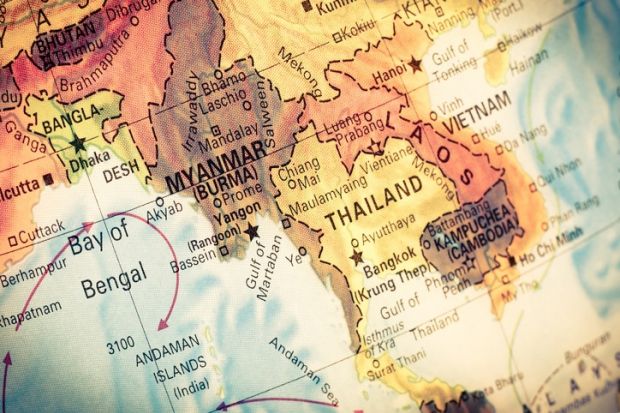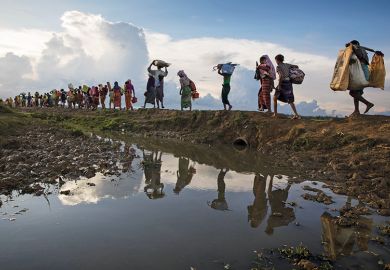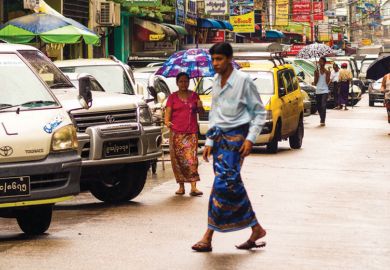In a recent Times Higher Education article, Lee Jones, reader in international politics at Queen Mary University of London, addresses a growing sentiment that, given current political and humanitarian crises, international universities should have nothing to do with Myanmar:
“Myanmar’s education system is in a truly atrocious state and help is desperately needed,” he says.
For those teachers and administrators in Myanmar earnestly engaged in lifting the standards of higher education, Jones’ remarks ring true. Whatever the motivation, removing support from students working within an already crippled education system would be devastating.
Kyaw Moe Tun, current director of the Parami Institute of Liberal Arts and Sciences in Yangon, Myanmar, remembers the pride he and his family felt when he received his degree as a newly minted PhD in chemistry from Yale University. It marked the perfect culmination of decades of sweat and sacrifice the family had endured for his education in the US.
Instead of looking for a job in New York or Los Angeles, Kyaw Moe Tun made the difficult decision to return to Yangon to help his nation rebuild.
He reached out to colleagues and friends at Simon's Rock (his alma mater in Massachusetts), Bard College, Centre College in Kentucky, Yale University, Ashoka University, Yale-NUS in Singapore and others, to gain as much experience and knowledge as he could.
"I wanted to create and share similar opportunities I once received at Bard and Yale with my fellow countrymen," Kyaw Moe Tun explains. "That was the beginning of my journey for the Parami Institute and my inspiration for creating change agents from all walks of life in Myanmar. It was really a great honor for me to be able to provide such opportunities with the help of my colleagues locally and internationally."
A team of young, optimistic professionals quickly formed around Kyaw Moe Tun, all educated in the UK and the United States, and all who – like him – chose the path to return home, to give birth to a world-class educational institution in Myanmar. Early counsel and aid from these international schools were key to creating the Parami Institute’s curriculum, infrastructure, administration and future plans for development.
A close mentor of Kyaw Moe Tun was U Ba Win, longtime vice-president of Bard College, who has for decades been at the heart of numerous educational initiatives in the United States and Myanmar, both public and private. One of his more recent projects has involved managing Bard College’s signature Writing and Thinking workshops at the historic Yangon University.
“Isolation is the last thing a country needs that has endured such a history,” U Ba Win remarks. “University professors at Mandalay and Yangon universities that I’ve worked with want and need more connections with the world. Having only just emerged from a 50-year long dark night when very little was spent on healthcare or education, the children and young people of Myanmar, as well as their teachers, need to reconnect with others.”
These collaborations and exchanges have only strengthened Myanmar’s education system and improved students’ chances of becoming more capable, knowledgeable and benevolent citizen leaders.
In 2005, Kyaw Moe Tun searched everywhere in Myanmar for a kind of university education that couldn’t be found. Now, 12 years later, improvements have been made to the state system, with educational visionaries on the cusp of introducing world-class models to the population. Much of this has been the result of the initial daring and generosity of pioneers who believed in the power of a liberal education to influence the minds and habits of a nation’s youth for good.
It is important to remember that it was during the darkest era of military rule under the State Peace and Development Council (SPDC) that international organisations such as the Cetana Educational Foundation and the Pre-Collegiate Program (PCP) arrived to sow the seeds of liberal education and critical thought. Writing off a generation because of the atrocities of a ruling junta would have ab initio stymied Kyaw Moe Tun, an alumnus of the Pre-Collegiate Program, and his efforts at Parami.
The only path forward to a more inclusive, informed and open society is through the kind of instruction that challenges students to think critically, to question assumptions and to investigate solutions from all perspectives. In Myanmar, this pursuit requires the continued counsel and support of international universities and colleges.
Myanmar youth are fighting to break through decades of violence and repression. The politically motivated gestures of foreign institutions to withdraw their support - however well-founded or well-justified - will only worsen this struggle.
President of Centre College, John A. Roush, advises us to consider carefully: "Now, more than ever, institutions of higher learning in Myanmar require assistance, from home and abroad, to give their young people the guidance and time required to create a more just, democratic society."
Kyle David Anderson, director of the Center for Global Citizenship Centre College in Kentucky, and Kyaw Moe Tun are part of the Parami University Founding Committee based in Yangon, Myanmar. The Parami University of Liberal Arts and Sciences will be Myanmar's first private and residential liberal arts college.
Register to continue
Why register?
- Registration is free and only takes a moment
- Once registered, you can read 3 articles a month
- Sign up for our newsletter
Subscribe
Or subscribe for unlimited access to:
- Unlimited access to news, views, insights & reviews
- Digital editions
- Digital access to THE’s university and college rankings analysis
Already registered or a current subscriber?






